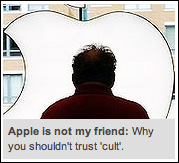
A few days ago in my post iPods Will Kill You! a couple of commenters thought I might be over-analyzing the current trend for the Fairfax media (among others) to be engaging in Apple-bashing. Naturally enough, my antennae have been quivering ever since, on the lookout for some further substantiation of my claim. Indeed, the ink was hardly dry on that post before Universal Head pointed out another instance in the Sydney Morning Herald the very next day.
And this morning, this, under the headline ‘Smart phone, pity criminals are proving even smarter’:
The global obsession with the iPhone is not only becoming a threat to security: an entire criminal industry has sprung up around it, says the head of the Australian Crime Commission.
The story goes on to detail how the head of the ACC, John Lawler, ‘said’ at an Australian Institute of Criminology conference, that Apple’s iPhone was a veritable treasure trove of criminal opportunity.
Only thing is, if you read the article carefully, Mr Lawler is never quoted once as having said anything of the sort. He never specifically names the iPhone in any of his attributed quotes. He certainly mentions ‘personal communication devices’ and ‘instant services’ but these are catchall phrases that cover a lot of ground
Now, I’m not saying that Mr Lawler didn’t actually mention the iPhone during his presentation, but there is no evidence of that in this article. The thing is, the piece is written in such a way that a casual reader could easily come away with the impression that he did.
Applying a little critical thinking to this story reveals it to be a wonderland of misdirection. Let me guide you through:
The global obsession with the iPhone…
The ‘obsession’ with the iPhone is no more an obsession than is the desire to own any other popular product. This so-called obsession is an invention of the media. People like their iPhones because they are useful and appealing. Why is that obsessive? Popularity doesn’t equal obsession, it just equals popularity. If anyone is obsessed with the iPhone, it’s the newspapers. They’re the ones obsessively telling us at every opportunity about how we’re obsessed with the iPhone.
This year Apple’s chief financial officer told a shareholder meeting that more than 70 Fortune 100 companies were either using or trying out iPhones, and it was rapidly replacing the BlackBerry as the must-have business phone.
This sentence follows quickly on the heels of Mr Lawler’s quote, deftly conflating the two paragraphs to give the inference that this was also said by him. The intention is obviously to imply to the reader that he also went on to say, in the next paragraph:
But unlike the BlackBerry and other smartphones, the iPhone does not allow a company’s IT staff to install and upgrade its own security software, leaving business networks at risk of penetration.
Whether nor not these are Mr Lawler’s thoughts (and this is far from clear), a discerning person can only respond SO WHAT? The banality of this statement is profound on so many levels. How many people with BlackBerries have security software installed by their IT department? I’d wager next to none. And, even if they do, what the heck does that entail? Some password protection? You can do that on the iPhone. Encrypted files? You can do that on the iPhone. A kill switch? The iPhone has that. What we’re supposed to believe here is that IT departments are the be-all and end-all of security – a myth kept in circulation largely by IT departments. The ultimate security on any system has to do with user responsibility. If the IT departments of corporations are really concerned about security they would do well to spend less time trying to solve problems with tech fixes and instead devote some serious energy to teaching their users some basic computer hygiene. My iPhone is secure. You can’t get my data if you find and steal my phone. And if you did steal it, I would remotely kill it (if you hadn’t already done it yourself by attempting to circumvent the security). Does the ACC think this is impossible on a iPhone? I don’t believe they’re that naive.
And anyway, let’s say the contention is true. Do we really want to compare it to the security of the open-system Android, or the plethora of Nokias, Samsungs and Sonys out there? Or perhaps the new Windows 7 phone? (Windows – now there’s a secure and virus-free environment!) The fact is that, as popular as the iPhone is, it is still well and truly outnumbered by other brands. This being the case, rather than be concerned with the security-catastrophe-that-is to-come when iPhones rule the planet, why is this story not about the security disaster that is already in place?
Mr Lawler also said the increasing ubiquity of the phone meant that criminals were finding more and more opportunities to use it to intrude, to steal and to defraud.
Well, DUH. I can’t even comment on this, except to say that once again this is not a direct quote from John Lawler. Why is the reporter giving us Mr Lawler’s non-specific-brand terms like ‘communications devices’ in direct first-person quotes and yet attributing anything about the iPhone at second hand? I’ll tell you exactly why – because if Mr Lawler didn’t single out the iPhone by name in his talk, it’s very easy for the reporter to say he intended ‘the phone’ in a much more general sense (as in ‘the mobile phone’). With that in mind, read that paragraph again and you’ll see what I mean. The English language is a sublimely slippery substance.
In fact, the next direct quote from John Lawler again mentions only ubiquitous technology:
”With the explosive uptake of personal communication devices there are certainly already opportunities that appeal to organised criminals,” said Mr Lawler.
That’s a sensible, if very general observation. Organised criminals use mobile phones! So do librarians.
Even the desire for the phone is creating a burgeoning black market, he said.
Yes, as has the desire for PS3s, Gucci handbags and cigarettes. Black markets spring up anywhere and everywhere that there is an item of value that can be produced without imprimatur and sold for less than a legitimate vendor’s prices. This is perhaps a point of interest, but hardly the stuff of news.
The most disturbing thing about this whole pile of non-news is that in the course of less than one day it’s been disseminated so widely that trying to search for any actual information about what John Lawler might really have said at the Institute of Criminology conference turns up only myriads of requoted versions of the Fairfax article. Pretty much all of them bandying around headlines like ‘iPhone Poses Threat to Security!’ Hundreds of dumb zines and tech blogs have just taken the Fairfax article completely at face value without an ounce of critical appraisal. Most of them quote the article word for word. Some of them get opinions from their own ‘experts’ expounding the crumminess of the iPhone’s security. Many of them plainly have vested interests or agendas. ((If you have time, go read some of the ones linked in the Google search. It is an astounding (and depressing) eye-opening example of uncritical re-mouthing of something that has low information and high titillation value.)) If this is not about trying to denigrate Apple products, then it has that sum effect anyway. Everyone who uncritically picked up this story did so because it felt good to put the boot in.
I would sincerely like to know what John Lawler said at that conference. Did he single out iPhones as promoting such a large and serious security problem? If so, what were his reasons, given that iPhones are no less secure than many other devices on the market? ((I’m not claiming that iPhones are the Fort Knox of mobile phones, by the way – just that as security risks go – as devices – they’re neither here nor there. They could be better, sure, but they are decent enough if you take the trouble to use their security features properly.)) Or did he, as I suspect, merely mention the iPhone as one of a growing number of mobile personal communication and computation devices that should take security more seriously?
I will continue to investigate this as I am able, but if anyone was at that conference, or has any more information, I’d love to hear from you.










